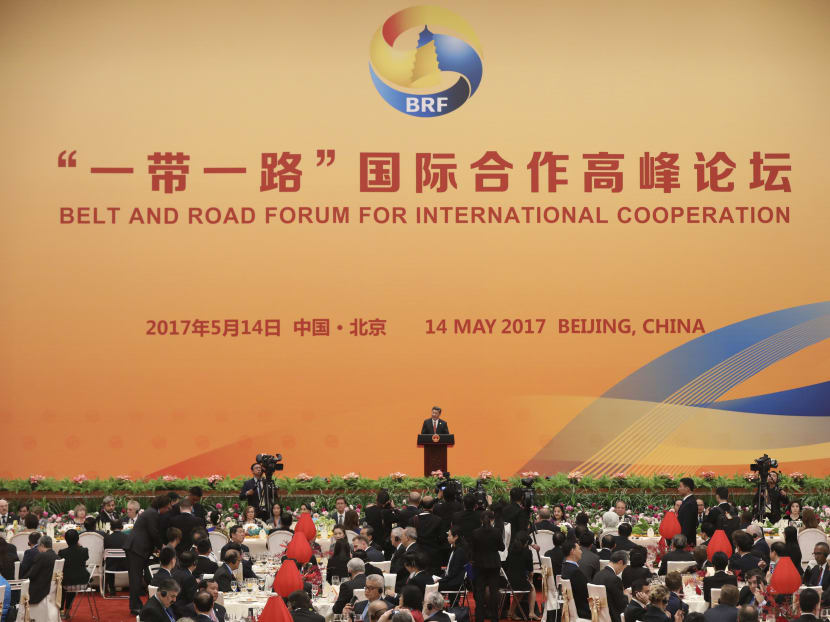'Simplistic and flawed' to think aligning with China would sway its decisions: Chee Hong Tat
SINGAPORE — Critics who suggest that Singapore should align more closely more with China so it would stop investing in competitive projects in neighbouring countries are drawing "a simplistic and flawed conclusion", Senior Minister of State Chee Hong Tat said on Friday (May 26).

Chinese President Xi Jinping delivers his speech during the welcoming banquet for the Belt and Road Forum at the Great Hall of the People in Beijing, May 14, 2017. Photo: Reuters
SINGAPORE — Critics who suggest that Singapore should align more closely more with China so it would stop investing in competitive projects in neighbouring countries are drawing "a simplistic and flawed conclusion", Senior Minister of State Chee Hong Tat said on Friday (May 26).
Speaking at the commencement ceremony of the Future China Advanced Leaders Programme, Mr Chee pointed out that Beijing is making investments in the region to enhance its connectivity and energy security, and that these decisions are based on China's own national interests.
"Some people read media reports and are concerned about Singapore’s relations with China, and asked if Singapore should align more closely with China. A few have suggested that by doing so, China would not be investing in our neighbouring countries to compete with Singapore," he added.
"This is a simplistic and flawed conclusion."
It is in Singapore and the region's interest that China succeeds, said Mr Chee, adding that the Republic will work on enhancing the close bilateral cooperation with Beijing and not take the strong foundation built by the two countries' late leaders, Mr Lee Kuan Yew and Mr Deng Xiaoping, for granted.
He acknowledged, however, that it was inevitable that Singapore and China would have different views on certain issues from time to time.
Deputy Prime Minister Teo Chee Hean made a similar point in a speech at the East Asia Institute earlier this week, noting that Singapore and China share a greater common interest in the region’s peaceful growth and development despite occasional differences in views.
“But even among close neighbours and friends, there may be different perspectives on some issues, given that countries are of different sizes, have different histories, vulnerabilities, and geographical location,” said Mr Teo.
“But the fundamental position of our two countries, that we share a common interest in the peaceful growth and development of our two countries and the region, remains the same. Our common interest in building a peaceful and growing region is much greater than any occasional differences of views.”
The remarks by Mr Teo and Mr Chee came amid mounting speculation over the state of Singapore-China ties, in the wake of Prime Minister Lee Hsien Loong’s absence from the recent One Belt, One Road summit in Beijing, which was attended by several regional leaders, including Mr Najib Razak of Malaysia and Indonesia’s President Joko Widodo.
Singapore was represented by Minister for National Development and Second Finance Minister Lawrence Wong. When asked at the summit why Mr Lee did not attend, Mr Wong told the media that it was China that had decided on the invitations.
In his speech to lecturers and graduates of the Future China Advanced Leaders Programme on Friday, Mr Chee said Singaporeans should not be rattled by outlets which try to exaggerate negative news about Sino-Singapore ties.
"We should instead focus on further strengthening our bilateral ties with China at different levels and with different provinces - between government leaders, between businesses and between our people," he added.
Singapore's value and continued relevance to China, or any other major power, depended on its ability to remain successful, stable and credible, Mr Chee stressed.
"Speaking the same language, sharing the same cultural traditions and having ancestors who came from the same village several generations ago can be an advantage, but they are not going to get us very far if that is all we have to offer," he said.
The leadership programme, which is jointly organised by Business China and Nanyang Business School, aims to equip business leaders with an insider’s perspective of China’s development and emerging opportunities.
Commenting on China’s “Belt and Road” initiative, Mr Chee said the ambitious project, while not without its challenges, has the potential to help benefit many countries in the region economically.
He added: "Our partnership with China is more than bringing investments into the country, but also working together with Chinese companies to innovate new technologies, develop new products and services and invest in other markets, including Asean and Central Asia."









